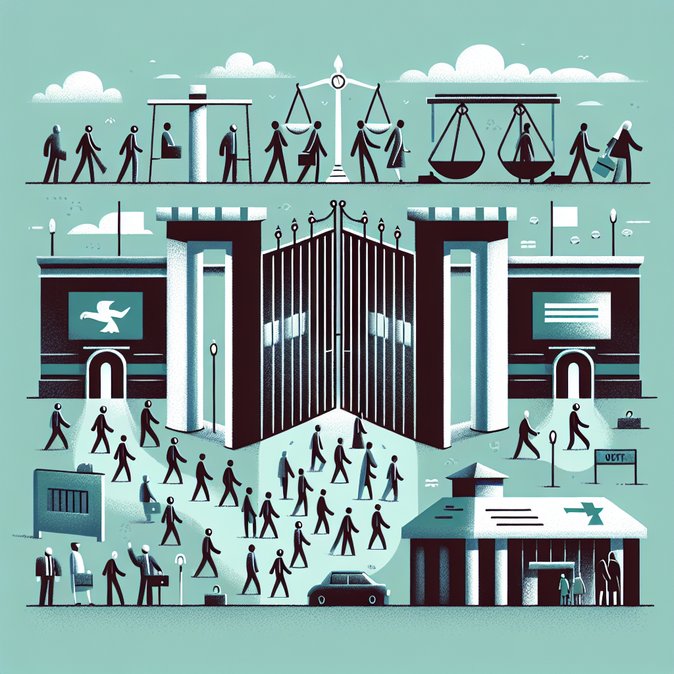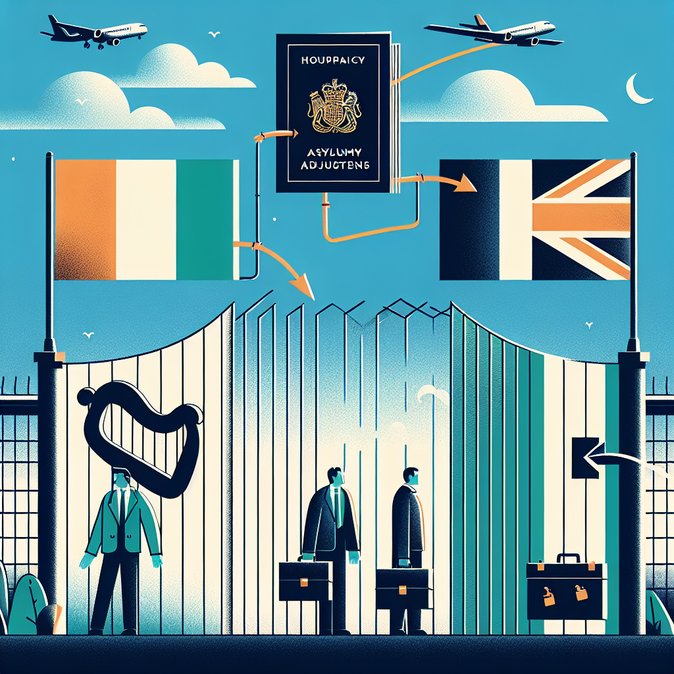
The Irish Government signalled on Tuesday, 18 November 2025, that it may have to legislate quickly to keep pace with the United Kingdom’s most radical overhaul of asylum rules in forty years. Home Secretary Shabana Mahmood’s Westminster package – which promises faster removals and tougher enforcement – has raised alarm in Dublin that migrants refused in Britain could exploit the open land border with Northern Ireland to lodge claims in the Republic.
Speaking to UTV, Justice Minister Jim O’Callaghan stressed that while the Common Travel Area (CTA) remains a cornerstone of British-Irish relations, “changes to the UK asylum laws can have an impact in Ireland and have had an impact in the past.” The Minister noted that more than four-fifths of recent irregular arrivals first reached Great Britain before travelling on to Belfast and crossing southwards. Officials are now reviewing visa policy, carrier liability rules and secondary legislation that could be appended to the International Protection Bill due before the Oireachtas next month.
Business groups are watching the debate closely. Major multinational employers rely on friction-free mobility for staff shuttling between operations in Dublin, Belfast and London. Any move to introduce systematic checks on the island of Ireland would add costs and complicate supply chains. At the same time, tech and pharmaceutical firms fear that harsher rhetoric could make Ireland seem less welcoming to global talent, undermining hard-won recruitment advantages.
![Irish Government considers tightening immigration rules as UK unveils sweeping asylum reforms]()
Border communities are equally concerned. For residents of Counties Louth, Monaghan and Donegal, cross-border commuting is part of daily life; local chambers of commerce worry that stepped-up policing could recreate pre-Good-Friday-Agreement frictions. Civil-society groups warn that migrants may be scapegoated amid heightened political tensions on both sides of the border.
In practice, officials are exploring measures that would mirror British policy shifts without erecting hard infrastructure. Options include designating additional “safe countries” to accelerate inadmissible claims, raising documentation requirements for carriers arriving at Dublin Port and Airports, and expanding joint UK-Irish intelligence work targeting smuggling networks. A briefing note circulated to Cabinet suggests that amending the Immigration Act 2004 could give the justice minister power to introduce time-limited visa requirements for particular nationalities if displacement effects are detected.
Although no decisions have been taken, O’Callaghan emphasised that Ireland “needs to be nimble” and will not permit itself to become “a back door” to the Common Travel Area. Stakeholder consultations are expected over the coming fortnight. Businesses with cross-border staff movements should map existing travel patterns, review right-to-work documentation procedures and monitor further announcements from the Departments of Justice and Enterprise.
Speaking to UTV, Justice Minister Jim O’Callaghan stressed that while the Common Travel Area (CTA) remains a cornerstone of British-Irish relations, “changes to the UK asylum laws can have an impact in Ireland and have had an impact in the past.” The Minister noted that more than four-fifths of recent irregular arrivals first reached Great Britain before travelling on to Belfast and crossing southwards. Officials are now reviewing visa policy, carrier liability rules and secondary legislation that could be appended to the International Protection Bill due before the Oireachtas next month.
Business groups are watching the debate closely. Major multinational employers rely on friction-free mobility for staff shuttling between operations in Dublin, Belfast and London. Any move to introduce systematic checks on the island of Ireland would add costs and complicate supply chains. At the same time, tech and pharmaceutical firms fear that harsher rhetoric could make Ireland seem less welcoming to global talent, undermining hard-won recruitment advantages.

Border communities are equally concerned. For residents of Counties Louth, Monaghan and Donegal, cross-border commuting is part of daily life; local chambers of commerce worry that stepped-up policing could recreate pre-Good-Friday-Agreement frictions. Civil-society groups warn that migrants may be scapegoated amid heightened political tensions on both sides of the border.
In practice, officials are exploring measures that would mirror British policy shifts without erecting hard infrastructure. Options include designating additional “safe countries” to accelerate inadmissible claims, raising documentation requirements for carriers arriving at Dublin Port and Airports, and expanding joint UK-Irish intelligence work targeting smuggling networks. A briefing note circulated to Cabinet suggests that amending the Immigration Act 2004 could give the justice minister power to introduce time-limited visa requirements for particular nationalities if displacement effects are detected.
Although no decisions have been taken, O’Callaghan emphasised that Ireland “needs to be nimble” and will not permit itself to become “a back door” to the Common Travel Area. Stakeholder consultations are expected over the coming fortnight. Businesses with cross-border staff movements should map existing travel patterns, review right-to-work documentation procedures and monitor further announcements from the Departments of Justice and Enterprise.


